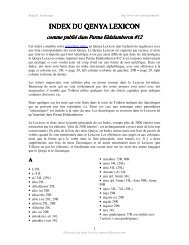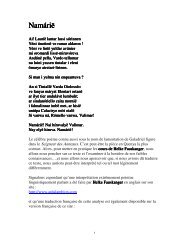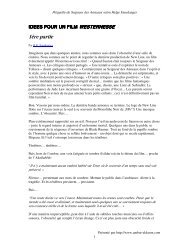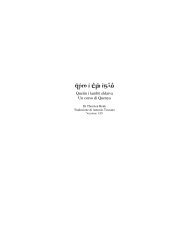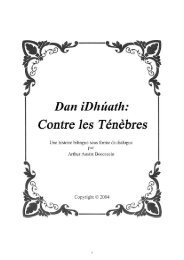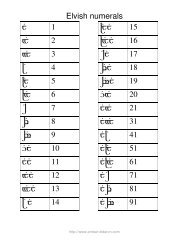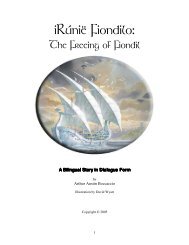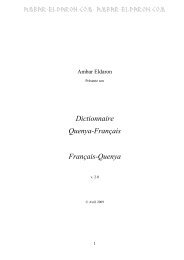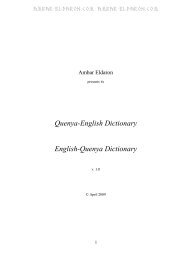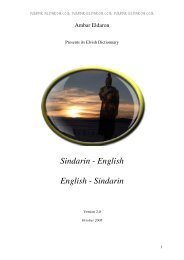Quenya Reverse Wordlist - Ambar Eldaron
Quenya Reverse Wordlist - Ambar Eldaron
Quenya Reverse Wordlist - Ambar Eldaron
You also want an ePaper? Increase the reach of your titles
YUMPU automatically turns print PDFs into web optimized ePapers that Google loves.
Helge K. Fauskanger http://www.uib.no/People/hnohf/<br />
nerématnacla alcantaméren ("k") "made it<br />
shine" (with a fem.pl. subject; the ending -ren<br />
probably means "they" of women, but the ending does<br />
not have to be translated here) (MC:216; this is<br />
"Qenya")<br />
neret teren, terenë "slender" (TER/TERES)<br />
nesíh hísen "of mist" (MC:221; this may be<br />
"Qenya", but it connects with hísë.)<br />
nessil -lissen or -lissë ending for partitive pl.<br />
locative (Plotz); see -li<br />
nessiracla alcarissen ("k") "in light-rays" (a<br />
"Qenya" form from MC:221; alcar means "glory" in<br />
mature <strong>Quenya</strong>)<br />
nésurE Erusén "the children of God"<br />
(RGEO:74; this is a weird form with no plural ending.<br />
The normal form seems to be Eruhíni.)<br />
net ten "for", in Fíriel's Song; apparently<br />
replaced by an in mature <strong>Quenya</strong>.<br />
net ten- "hear", future tense tenuva<br />
(MC:213; in mature <strong>Quenya</strong>, "hear" is hlar-)<br />
netn -nten ending for dual instrumental<br />
(Plotz)<br />
néuq quén (quen-, as in pl. queni; as final<br />
element in compounds -quen) "one, (some)body,<br />
person, individual, man or woman", pl. queni =<br />
"persons", "(some) people", "they" with the most<br />
general meaning (as in "they [= people in general] say<br />
that..."). Combined with noun and adjective stems in<br />
old compounds to denote habitual occupations or<br />
functions, or to describe those having some notable<br />
(permanent) quality; examples include roquen,<br />
ciryaquen, arquen, q.v. Also in aiquen, ilquen<br />
(WJ:361 cf. 360, 372)<br />
neuqayric ciryaquen "shipman, sailor"<br />
(WJ:372).<br />
neuqia aiquen "if anybody, whoever"<br />
(WJ:372)<br />
neuqli ilquen "everybody" (WJ:372)<br />
neuqor roquen "horseman [but the <strong>Quenya</strong><br />
word does not show gender], rider, knight" (WJ:372,<br />
UT:282)<br />
neuqra arquen "a noble" (WJ:372)<br />
neurehemún númeheruen *"of the Lord of<br />
the West" (Manwë) (SD:290); this is "Qenya" with<br />
genitive in -en instead of -o as in mature <strong>Quenya</strong><br />
neureV rA Ar Veruen *"Day of the<br />
Spouses" (Aule and Yavanna) (LEP/LEPEN/LEPEK;<br />
this is "Qenya" with genitive in -n.)<br />
neurevrA Arveruen third day of the<br />
Valinorian week of 5 days, dedicated to Aule and<br />
Yavanna (BES)<br />
néw wén "greenness, youth, freshness"<br />
(GWEN), blended with wendë "maid"<br />
new wen "maid, girl" (*wend-), in early<br />
"Qenya" also wendi (the mature <strong>Quenya</strong> form wendë<br />
47<br />
occurs in MC:215 and in Etym, stems GWEN,<br />
WEN/WENED). (LT1:271, 273)<br />
new -wen "maiden", a frequent ending in<br />
feminine names like Eärwen *"Sea-maiden"<br />
(SA:wen). Early "Qenya" also has -wen feminine<br />
patronymic *"daughter of" (LT1:271, 273), but the<br />
the patronymic ending seems to be -iel "-daughter" in<br />
mature <strong>Quenya</strong>.<br />
newlaL Lalwen (also longer Lalwendë)<br />
"Laughing Maiden", fem. name (PM:343)<br />
newle elwen "heart" (LT1:255; rather hón or<br />
indo in mature <strong>Quenya</strong>)<br />
newlo olwen (olwenn-) "branch, wand,<br />
stick" (LT2:342)<br />
newnaM rA Ar Manwen *"Day of Manwe"<br />
(LEP/LEPEN/LEPEK; this is "Qenya" with genitive<br />
in -n.)<br />
néy yén (pl. yéni in Nam, obsoleting yen[i]<br />
in the Etymologies, stem YEN), Elvish "long year" of<br />
144 solar years, 52,596 days (Nam, Appendix D, E;<br />
RGEO:66. Tolkien earlier defined yén as 100 solar<br />
years; see PM:126; in the Etymologies, stem YEN, it<br />
seems to mean simply "year".) Yénonótië<br />
*"reckoning of years" (MR:51)<br />
ney yen, yendë "daughter" (YÔ/YON. This<br />
word replaced another form, but the latter may have<br />
been restored; see yeldë.)<br />
ni in a strange particle occurring in the<br />
phrase i-coimas in-<strong>Eldaron</strong> "the coimas [lembas] of<br />
the Eldar" in PM:403. It looks like the Sindarin plural<br />
article, but in <strong>Quenya</strong> i is both sg. and pl. "the", and<br />
the word Eldar does not normally take any article at<br />
all. The alternative reading i-coimas <strong>Eldaron</strong><br />
(PM:395) is probably to be preferred.<br />
ni -in dative pl. ending, seen in eldain,<br />
fírimoin, q.v.<br />
niaracla alcarain ("k") "shining" (pl - sg<br />
*alcara?) (MC:221; this is "Qenya")<br />
niclah halcin ("k") "frozen" (LT1:254)<br />
niclih hilcin ("k") is glossed "it freezes"; if<br />
this word is to adapted to mature <strong>Quenya</strong>, it would<br />
have to mean "I freeze" (LT1:254)<br />
nicseH Hescin ("k") "winter one" (???)<br />
(LT1:255)<br />
nidnamoro oromandin "wood-spirits"<br />
(MC:215; this is "Qenya")<br />
nidnan nandin "fay of the country"<br />
(LT1:261)<br />
nietnauq quantien ("q") "last day of year"<br />
(YEN). The word is assigned a different meaning in<br />
PM: quantien ("q") "full year" = yén, a period of 144<br />
solar years (PM:126; pl. quantiéni, PM:127). Since<br />
the latter meaning comes from drafts for the LotR<br />
Appendices that did not make it into the published<br />
LotR, it should perhaps be ignored.<br />
Presented by http://www.ambar-eldaron.com



